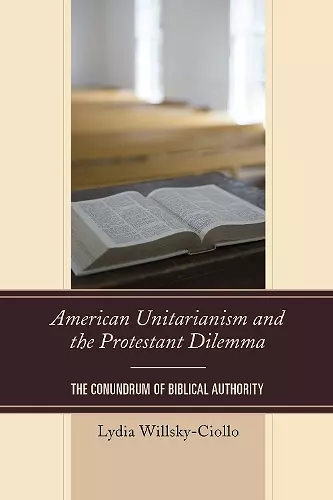American Unitarianism and the Protestant Dilemma
The Conundrum of Biblical Authority
Format:Hardback
Publisher:Lexington Books
Published:11th Nov '15
Currently unavailable, and unfortunately no date known when it will be back

American Unitarians were not onlookers to the drama of Protestantism in the nineteenth century, but active participants in its central conundrum: biblical authority. Unitarians sought what other Protestants sought, which was to establish the Bible as the primary authority, only to find that the task was not so simple as they had hoped. This book revisits the story of nineteenth century American Unitarianism, proposing that Unitarianism was founded and shaped by the twin hopes of maintaining biblical authority and committing to total free inquiry. This story fits into the larger narrative of Protestantism, which, this book argues, has been defined by a deep devotion to the singular authority of the Bible (sola scriptura) and, conversely, a troubling ambivalence as to how such authority should function. How, in other words, can a book serve as a source of authority? This work traces the greater narrative of biblical authority in Protestantism through the story of four main Unitarian figures: William Ellery Channing, Andrews Norton, Theodore Parker, and Frederic Henry Hedge. All four individuals played a central role, at different times, in shaping Unitarianism, and in determining how exactly religious authority functioned in their nascent denomination. Besides these central figures, the book goes both backward, examining the evolution of biblical authority from the late medieval period in Europe to the early nineteenth century in America, and forward, exploring the period of Unitarian experimentation of religious authority in the late nineteenth century. The book also brings the book firmly into the present, exploring how questions about the Bible and religious authority are being answered today by contemporary Unitarian Universalists. Overall, this book aims to bring the American Unitarians firmly back into the historical and historiographical conversation, not as outliers, but as religious people deeply committed to solving the Protestant dilemma of religious authority.
American Unitarianism and the Protestant Dilemma is a well detailed and deftly argued work. Willsky-Ciollo is convincing in her declaration that Unitarians were equally consumed by some of the same developments as other Protestant faiths, and in her explanation as to how the final break with the issue was made in the post-Civil War era, despite lasting internal divisions and persistent deviation from the mainstream…. This is a significant work that adds much to the growing body of work on Unitarianism, and it nicely contextualizes something that has not been as frequently or clearly emphasized in prior works. * New England Quarterly *
Lydia Willsky-Ciollo’s thoroughly researched study returns the Bible to the center of nineteenth-century Unitarian history, showing that Unitarians and Transcendentalists wrestled as intensely as their neighbors with the paradoxes of scriptural authority. Willsky-Ciollo demonstrates that the history of religious liberalism and the history of the Bible in America belong together. -- Dan McKanan, Harvard Divinity School
Revisiting the principal makers of antebellum Unitarianism, this book breaks new ground by locating their project of reform and, especially, their uses of the Bible, in the context of a broader anxiety about the sources of authority within the Christian tradition. Rebels against authority in some sense, the early Unitarians also argued among themselves and with others about the merits of free inquiry and whether to regard the visible church as a divine institution. A crisp, well-argued intellectual history of an important moment. -- David D. Hall, Harvard Divinity School
Synthetic studies of Unitarianism have long been absent from the historiography of religion in America/the United States, and this book fills that critical gap. By taking a biographical approach, [Willsky-Ciollo] tackles the slipperiness of Unitarian theology in the best way possible, demonstrating Unitarianism’s break from New England “Presbygationalism” and its gradual drift away from bibliocentric and Christocentric Protestantism under the influence of Transcendentalism. -- John Howard Smith, Texas A&M University–Commerce
Lydia Willsky-Ciollo’s American Unitarianism and the Protestant Dilemma offers a fresh and important perspective on the emergence of American liberal religion. Through her exploration of the intellectual history of key Unitarian and Transcendentalist figures, Willsky-Ciollo puts aside past arguments that focus on theological and ecclesial controversies and instead concentrates on the question of religious and Biblical authority and how it played out among Calvinists, Unitarians, and Transcendentalists in the nineteenth century. In this work, Willsky-Ciollo asks meaningful questions on the role of religious authority which open a window on the transformation and formation of American Protestantism. -- Nicole Kirk, Meadville Lombard Theological School
ISBN: 9780739188927
Dimensions: 237mm x 160mm x 24mm
Weight: 567g
306 pages